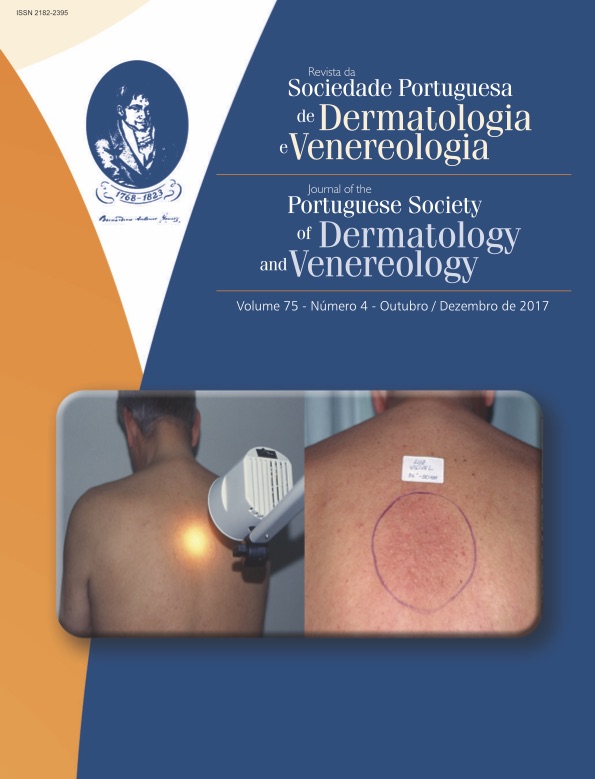Idiopathic Recurring Angioedema: A Possible Case of Hereditary Angioedema Type III
Abstract
Three types of hereditary angioedema (HAE) have been described within the spectrum of idioptahic nonhistaminergic angioedema. Type I and II related with C1-INH (C1-esterase inhibitor) deficiency is more frequent and type III is rare, occurs mostly in young women, without C1 inhibitor (C1-INH) alterations, and may be associated with mutations in the factor XII gene. Trauma, stress and estrogen may be the precipitants, treatment is still a challenge due to the absence of controlled studies. We present a case of possible type III HF in a young woman, aggravated by the introduction of anti-conception and improvement with its suspension and treatment with tranexamic acid, but without a family history or a factor XII mutation.
Downloads
References
Ferraro MF ArrudaKL, Maia LS, Moreno AS. Hereditary
angioedema and other forms of bradykinin-mediated
angioedema: update on diagnosis and treatment. Braz J
Allergy Immunol. 2014; 2:6-20.
Valle SR, França AT, Campos R, Grumach AS. Hereditary
angioedema. Rev Bras Alerg Imunopatol. 2010; 33:80-7.
Frank MM. Hereditary angioedema: a current state-of-
-the-art review, VI: novel therapies for hereditary angioedema.
Ann Allergy Asthma Immunol. 2008; 100:S23-9.
Banerji A, Sloane DE, Sheffer AL. Hereditary angioedema:
a current state-of-the-art review, V: attenuated androgens
for the treatment of hereditary angioedema.
Ann Allergy Asthma Immunol. 2008; 100:S19-22.
Bork K, Barnstedt S, Koch P, Traupe H. Hereditary angioedema
with normal C1-inhibitor activity in women.
Lancet. 2000; 356:213-217.
Binkley KE, Davis A 3rd. Clinical, biochemical, and genetic
characterization of a novel estrogen-dependent
inherited form of angioedema. J Allergy Clin Immunol.
; 106:546-50.
Miranda AR, Ue AP, Sabbag DV, Furlani WJ, Souza PK,
Rotta O. Angioedema hereditário tipo III (estrógeno-dependente):
relato de três casos e revisão da literatura.
An Bras Dermatol. 2013; 88:587-93.
Bianchi PG, França AT, Grumach AS. Diretrizes do
diagnóstico e tratamento do angioedema hereditário.
Rev Bras Alerg Imunopatol. 2010; 33:241-52.
Bouillet L. Hereditary angioedema in women. Allergy Asthma
Clin Immunol. 2010; 6:17.
Lumry WR, Castaldo AJ, Vernon MK, Blaustein MB, Wilson
DA, Horn PT. The humanistic burden of hereditary
angioedema: Impact on health-related quality of
life, productivity, and depression. Allergy Asthma Proc.
; 31:407-14.
Deroux A, Boccon-Gibod I, Fain O, Pralong P, Ollivier
Y, Pagnier A, et al. Hereditary angioedema with normal
C1 inhibitor and factor XII mutation: a series of 57 patients
from the French National Center of Reference for
Angioedema. Clin Exp Immunol. 2016; 185:332-7.
Bowen T, Cicardi M, Bork K, Zuraw B, Frank M, Ritchie
B, et al. Hereditary angioedema: a current state-of-the-
-art review, VII: Canadian Hungarian 2007 International
Consensus Algorithm for the Diagnosis, Therapy, and
Management of Hereditary Angioedema. Ann Allergy
Asthma Immunol. 2008; 100:S30-40.
Andrade, P. Erythema Marginatum-like. Rev Soc Port
Dermatol Venereol. 2016; 74: 413-4.
Germenis A, Speletas M. Genetics of hereditary angioedema
revisited. Clin Rev Allergy Immunol. 2016;
:170-82.
Giavina-Bianchi P, Motta A, Kalil J. Therapeutic agents for
hereditary angioedema. N Engl J Med. 2011; 364:84-6.
Bork K, Gül D, Hardt J, Dewald G. Hereditary angioedema
with normal C1 inhibitor: clinical symptoms and
course. Am J Med. 2007; 120:987-92.
Tallroth GA. Long-term prophylaxis of hereditary angioedema
with a pasteurized C1 inhibitor concentrate.
Int Arch Allergy Immunol. 2010; 154:356-59.
Farkas H, Czaller I, Csuka D, Vas A, Valentin S, Varga
L, et al. The effect of long-term danazol prophylaxis on
liver function in hereditary angioedema in hereditary
angioedema-a longitudinal study. Eur J Clin Pharmacol.
; 66:419-26.
Cicardi M, Banerji A, Bracho F, Malbrán A, Rosenkranz
B, Riedl M, et al. Icatibant, a new bradykinin-receptor
antagonist, in hereditary angioedema. N Engl J Med.
; 363:523-31.
Zuraw BL, Busse PJ, White M, Jacobs J, Lumry W, Baker
J, et al. Nano ltered C1 inhibitor concentrate for treatment
of hereditary angioedema. N Engl J Med. 2010;
:513-22.
Cicardi M, Levy RJ, McNeil DL, Li HH, Sheffer AL, Campion
MM, et al. Ecallantide for the treatment of acute
attacks in hereditary angioedema. N Engl J Med. 2010;
:532-41.
Bygum A, Andersen KE, Mikkelsen CS. Self-administration
of intravenous C1-inhibitor therapy for hereditary
angioedema and associated quality of life benefits. Eur J
Dermatol. 2009; 19:147-51.
Brown NJ, Byiers S, Carr D, Maldonado M, Warner BA.
Dipeptidyl peptidase-IV inhibitor use associated with increased
risk of ACE inhibitor-associated angioedema.
Hypertension. 2009; 54:516-23.
Cugno M, Castelli R, Cicardi M. Angioedema due to
acquired C1- inhibitor de ciency: a bridging condition
between autoimmunity and lymphoproliferation. Autoimmun
Rev. 2008; 8:156-9.
Birjmohun RS, Kees Hovingh G, Stroes ES, Hofstra JJ,
Dallinga- Thie GM, Meijers JC, et al. Effects of short-
-term and long-term danazol treatment on lipoproteins,
coagulation, and progression of atherosclerosis: two clinical
trials in healthy volunteers and patients with hereditary
angioedema. Clin Ther. 2008; 12:2314-23.
Aygören-Pürsün E, Magerl M, Graff J, Martinez-Saguer
I, Kreuz W, Longhurst H, et al. Prophylaxis of hereditary
angioedema attacks: A randomized trial of oral plasma
kallikrein inhibition with avoralstat. J Allergy Clin Immunol.
; 138:934-6.
Bowen T, Cicardi M, Farkas H, Bork K, Longhurst HJ,
Zuraw B, et al. 2010 International consensus algorithm
for the diagnosis, therapy and management of hereditary
angioedema. Allergy Asthma Clin Immunol. 2010;
:24.
All articles in this journal are Open Access under the Creative Commons Attribution-NonCommercial 4.0 International License (CC BY-NC 4.0).








